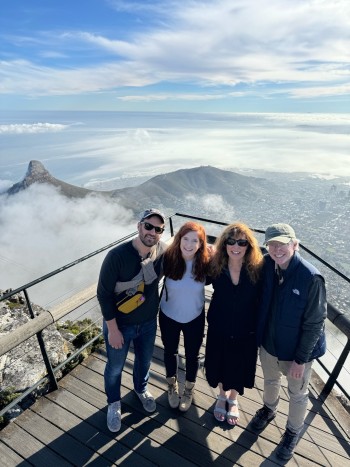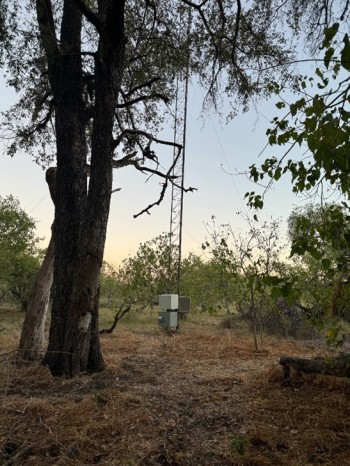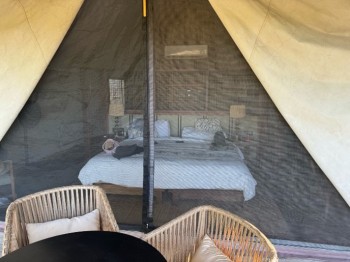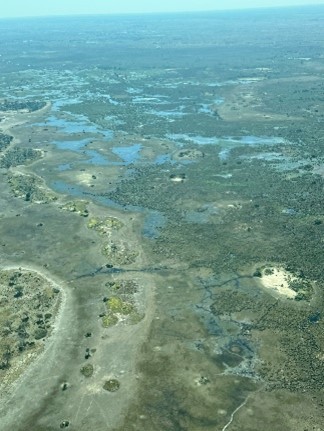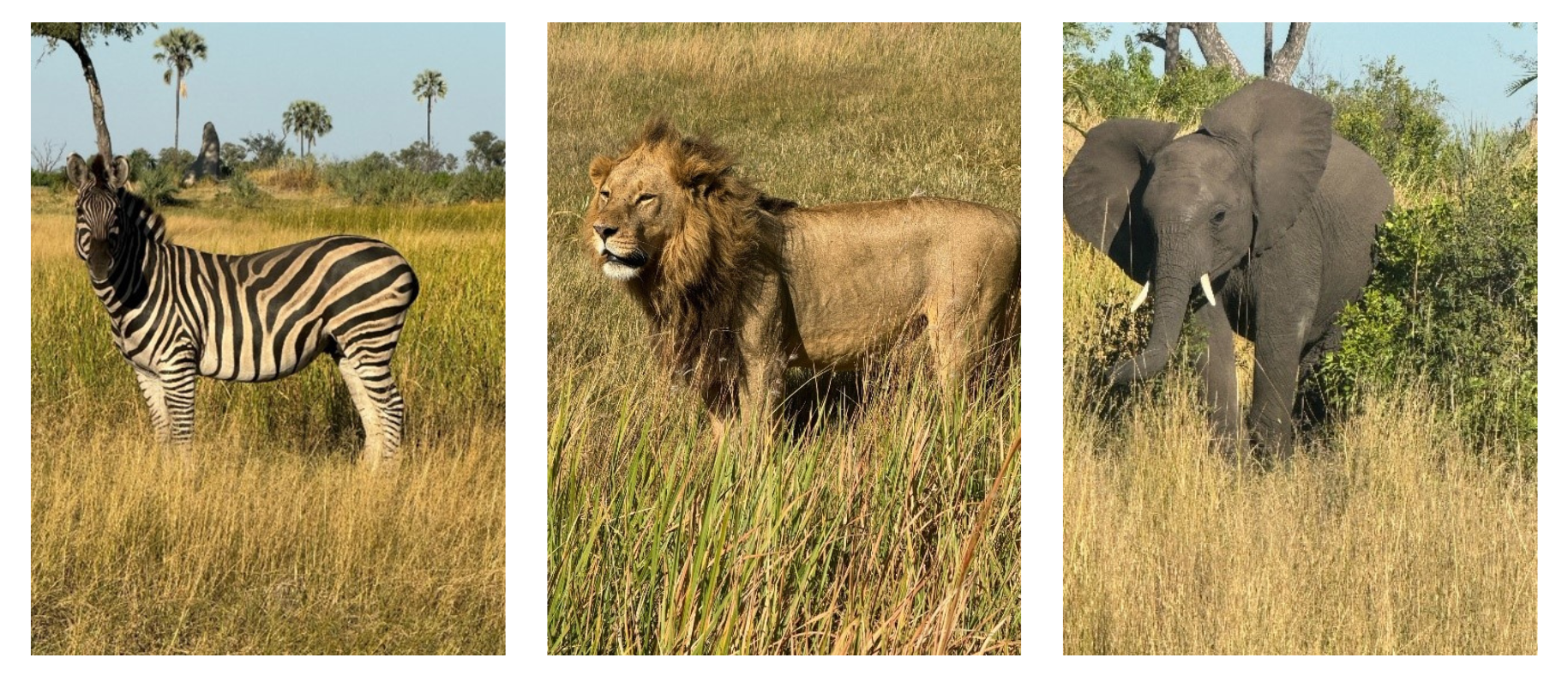In the continued spirit of celebrating my husband, who, despite all of those years of joking that he would never make it to retirement age given some earlier health challenges he went through, is likely healthier and more active than ever, I wanted to share how we prioritize ways to see the world while also recognizing life milestones.
Don’s upcoming milestone is his retirement after 40-some years of practicing law. That alone sounds exhausting and worthy of celebration, but when coupled with news that our youngest daughter, Kelsey, is getting married this fall, we went for a “two-fer” celebration of retirement and pre-wedding time together.
Throwing a dart on the map would put too vague a point on where we chose to meet up. Given Don’s love of Africa, as well as the desire of Kelsey and her fiancé Reade to experience a more immersive trip to the continent, it was decided our family time would be spent on a safari adventure.
Where to Go and Who to Travel With? Once we decided on a continent, the next task was settling on a location. Given that our prior visits to Kenya, South Africa, Tanzania and Zimbabwe had all allowed for unique experience, we settled on Botswana. Nearly 38 percent of Botswana’s landmass is set aside as national parks, and I am certain that allows tourism to be a huge financial driver. That in turn makes Botswana far more politically and economically stable than other locations in Africa.
Who to travel with was far easier given our history of traveling with andBeyond, a company based in Africa with a mission of cultivating the land, the people and the animals. A portion of the trip cost is put back into local schools, scholarship and training programs and conservancy, a top priority when it comes to protecting endangered animals. They also focus on sustainability, as our previous camps were powered primarily through solar energy. If you think about it, it makes sense given the amount of sunshine, the small sizes of the camps and remoteness of their locations.
I always find the exploration of infrastructure built in the bush to be fascinating and a comparative analysis to rural America decades prior. Each camp has relatively robust WiFi systems that are microwave fed and, while the idea of being able to completely check out from the world is an appealing concept, it’s also terrifying for me. I don’t know, maybe it’s too much FOMO (fear of missing out) and concern over issues that I might need to deal with, even with Mike Romano holding down the fort beautifully for me! It’s always fascinating to me that, as we arrive in the African bush, my biggest challenge is getting my time zones straight, not my connectivity. That being said, once you leave the camp, there is not even a hint of cell service until you actually come to a city.
The Adventure Begins: I’m not going to lie, the 17-hour scheduled flight from Atlanta to Johannesburg, South Africa, was daunting in concept. In reality, when the pilot announced that the nice tailwind meant a just-under 15 hours journey, we felt like we were given a gift. That didn’t mean that it was easy, particularly for one who doesn’t sleep on planes, but I caught up on all of my new movie releases and finished a few books. Plus, while we left Atlanta at 9:30 p.m. ET, we landed locally the following day in South Africa at 7 p.m. This meant that I could eat dinner and head to bed quickly and not look like I was trying to cut any corners.
Our flight to our first camp in Botswana was a commercial flight that flew into Kasane, near the Chobe River, a water source that runs through a number of countries in Africa. This was where we also said goodbye to commercial airlines until the end of the trip. Then we were off to the Muchenje Lodge, where we spent two full days touring the national park there and encountering wildlife that was anxious to find the somewhat limited water supplies due to drier weather this year. I made a rookie mistake our first evening there, however, as I ate some lettuce and brushed my teeth with tap water. I know better than to not follow the adage of “cook it, peel it or leave it,” so let’s just say I was glad I had gotten an evening safari drive in before my body had a fight with the bacteria in the water system. Even as my body battled, I kept thinking about the local elephants we’d seen munching away in the dark. I needed a little break the following morning, and I sent everyone else on their way while I broke open my traveling medicine kit. I was more irritated with myself than anything else, I simply knew better and had gotten careless.
Life in a Safari Camp: There is no pretense that you lounge around on a safari! Wake-up calls are at 5:30 a.m. (thankfully, often with a cup of coffee delivered), then it’s a 6 a.m. escort to the center of camp and into the Jeeps you go. The mornings are cool, although there are blankets and hot water bottles to take the nip out of the air. Still, fall is heading into winter for the southern hemisphere, so I kept having to remember the change of seasons. After heading out, you ride for about four to five hours, tracking what your guide and tracker see in the bush and truly trying to follow and find the animals. After the morning trek, it’s back to camp for lunch and a short siesta, a shower to wash off the dust of the morning and then back to the main area of the lounge for tea at 4 p.m. (the English influence runs strong).
The afternoon/evening ride consists of watching the animals come back out after hiding from the afternoon heat and tracking the predators on their hunt for food. After that, it’s another journey back to camp (this time in the dark) and a trip straight to dinner. An earlyish meal is critical so the guides can escort everyone back to their tent or unit and get to bed at a reasonable hour themselves. We have always taken the precautions seriously, and the importance of that was even more evident after leaving dinner one night with a small group only to have our guide tell us to be quiet, turn around quickly and turn our phone flashlights on as we wound away from an elephant that was blocking our path. I’m not going to lie, my heartbeat quickened a bit. I was surprised how some in our group didn’t take it seriously, until they did, because so many people still think this is a Disney World experience instead of humans needing to find the right place in an animal’s world. Of course, I learned that quickly after I had a stare down with a small monkey or baboon who made off with my breakfast one morning. I’m pretty sure I have never moved as quickly as I did when he jumped on the table and snatched my scone, all the while laughing at me.
Off To The Okavango Delta: Our wildlife experience concluded with two camps in the Okavango Delta, a spectacular area that can be described as an oasis. The area is classified as one of the Seven Wonders of the World and a protected UNESCO site. The sands of the Kalahari Desert make up much of the ground, yet the sheer volume of water that flows through the area on a seasonal basis completely transforms the landscape. Millions of years ago, the Okavango River flowed into a vast inland lake before joining the Limpopo and emptying into the Indian Ocean. However, movements in the earth’s crust cut off this route to the sea and stranded the Okavango River, essentially backing up its water flow, which results in seasonal flooding where the waters also come in from Angola. It’s why ariel pictures of the Delta Region shift month to month based on the rain flow and transform the land and the animal patterns continually. The flooding season is just beginning here, and the fact that it’s happening on top of a very dry time of the year makes for an interesting combination given the evaporating waterholes but increase in water.
This is also where we start to really leave civilization behind. The flights into this region are all on little bush planes that seat 11 (a civilized number for African bush air) and land on airstrips that often have giraffes wandering across them. I think they’re similar to a ride sharing service where you seldom end up at your end location without a few stops in between. I am also a big fan of limiting the number of takeoffs and landings in airplanes in my life, so this part of a trip to Africa is never a highlight for me. I always find myself stewing for months in advance as well as praying to the weather gods. These flights always serve as a reminder on why there are weight restrictions and no-wheels requirements on luggage.
As I write this, we are wrapping up our fifth day in the Delta Region, where we stayed at two separate ends of the water system, resulting in a geographically different experience and a little bit of a lesson in local politics for me. Botswana is dependent on Angola, a relatively war stricken country, for access to the annual flood waters that are so critical to the people and the wildlife here. There is actually a water commission that has been established between the two countries and Namibia to ensure that no country is cut off due to politics or tribal warfare. Access to water is difficult enough in Africa without making it a political football.
And Why Come All This Way? This trip was all about the animals. We did this to watch the herds of elephants tromp across the plains to a watering hole where they gleefully squirt water at one another and rub mud on themselves to keep cool. And to watch the lions devouring the rest of their morning kill and see that while they share. And to watch the wild dogs at play, licking each other’s noses and rolling in the grass before quickly turning into fierce killing machines as an antelope wanders by. And to watch a leopard leave her shaded place to mark and prowl the edges of the Savannah. And to watch the zebras moving as a herd (I still wonder why nature made them so vibrant). And to watch the white rhino “work out” with a log on his horn to keep in fighting form. And to see the adolescent male elephants who pretend to charge our safari Jeeps in an effort to keep their families safe. It is all truly indescribable. As if watching were not enough, every guide is also an educator on every animal, bug, bird and plant that lives here and a true tutor in nature conservancy. Who knew a dung beetle could be so amazing or that hyenas - forever tarnished by The Lion King – serve so many key roles in nature. I think the hyenas are a new secret favorite animal of mine having followed them in the bush for the past week.
How Do You Conclude a Safari week? We have journeyed to the African continent three times now, but this is the first time we have made the effort to fly down to the tip of this vast continent to Cape Town, South Africa. I am delighted that we took the few extra days to do so this time.
Cape Town is a simply stunning city that is surrounded by mountains and water, and the visuals from any side of the city required the camera being pulled out of the backpack. The area was originally settled by the Dutch in the 1500s and has that Dutch influence remaining, particularly in the Afrikaans language spoken by most. English and a strong Islamic culture are also most evident as tradesmen from Islamic countries were brought in as slaves by the Dutch. Even post-Apartheid, classes of color and religion are still evident but the history of freedom from Apartheid runs strong here. This is particularly true at Robben Island just offshore, where the history of its most famous resident, Nelson Mandela, is evident nearly everywhere you turn. That, coupled with the contrast of luxury waterfront properties a few miles from tin shanty townships where homemade electrical services pull power from the grid, highlights that the history of this country is never far in the rear-view mirror. Watching elections heating up – with 13 national parties – made it evident that we are not the only country consumed with contentious politics these days.
A journey to the Cape of Good Hope, seeing the African penguins, visiting small fishing villages and traveling to the top of Table Mountain, one of the new Seven Natural Wonder of the World, part of a mountain range four-times older than our Rocky Mountains, was spectacular. We learned that the mountain was declared a national park in 1998 by President Nelson Mandela, who had found it to be a beacon of hope that he could see from his prison cell on Robben Island. My other cultural take-away? Food is the language of love in South Africa, and I felt plenty loved after our time here.
My Takeaways:
- Share the gift of travel with loved ones when and where possible. Yes, this is a huge trip, and I am extraordinarily lucky to be able to take it as well as share it. But the experience of seeing new places, eating new foods, smelling new scents native only to that region, meeting people whose life experience is so very different from my own and always fascinating is something that both gives juice to my inquisitive nature and frankly also reminds me just how very lucky I am to have the gifts I have been given. Being able to do this with Kelsey and Reade and watch the experience through their eyes was a joy and a bigger gift to us than it was to them.
- Nature is amazing. From fight to flight instincts to natural camouflage to the infamous “Circle of Life,” we can learn so much from the animal kingdom and appreciating them in their own habitat is a learning experience.
- Life is simply too short to forget that half of the adventure is the journey itself, not just the destination. That’s a simple philosophy that I forget far too often.


